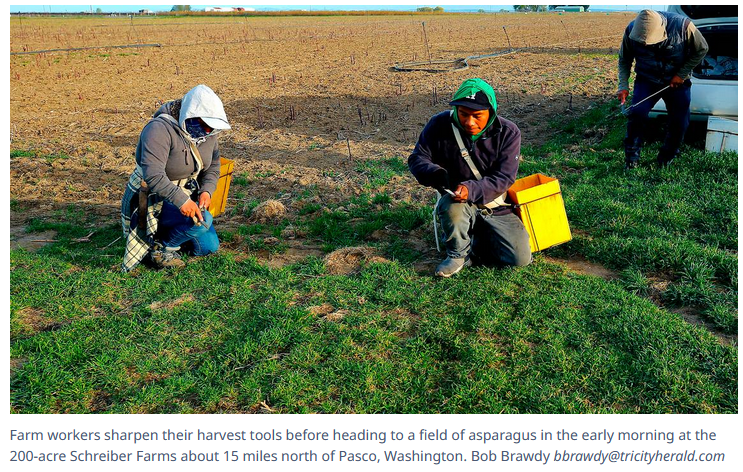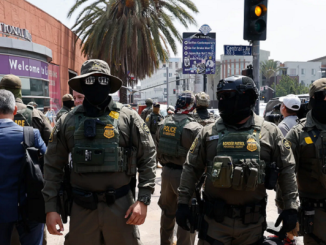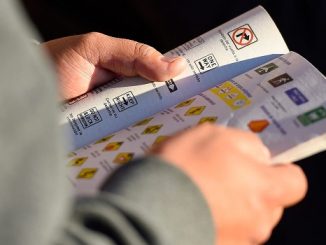By The Fresno Bee Editorial Board

Someone forgot to educate U.S. Agriculture Secretary Brooke Rollins about the immigrant skills and strong work ethnic that farmers depend on to plant, grow, and harvest the food that feeds the nation.
Days after President Donald Trump signaled a willingness to allow farmers “to vouch for these people” to keep their undocumented workers, mostly from Mexico, from being deported, Rollins threw cold water on the thought on Tuesday.
“There will be no amnesty. The mass deportations continue, but in a strategic way,” Rollins said at a Tuesday news conference in Washington, D.C. “And we move the workforce toward automation and 100% American participation, which with 34 million able-bodied on Medicaid, we should be able to do fairly quickly.”
Putting Medicaid recipients in charge of picking grapes or milking cows will cripple the country’s $543 billion agricultural industry, of which California accounts for about $59 billion.
Rollins accompanied Trump to Iowa on July 3 when the president said, “If a farmer is willing to vouch for these people in some way, Kristi (Noem, Homeland Security Secretary), I think we’re going to have to just say that’s going to be good, right?”
Trump said he didn’t want to “take all of the workers off the farms.” The USDA estimates that 40% of farm laborers are undocumented, although in California, some estimates go as high as 70%.
Rollins, standing next to Trump at the Iowa state fairgrounds in Des Moines, said she was working with Noem, Labor Secretary Lori Chavez-DeRemer and White House deputy chief of staff Stephen Miller to streamline the H-2A program “to make it cheaper, more efficient and more effective for those farmers.”
If an effective H2A program, which provides temporary workers for farmers who can’t find enough qualified domestic workers, is put in place, why would we need Medicaid recipients to do work they are not qualified to do?
In 2021, the United Farm Workers launched a “Take Our Jobs” campaign that offered to match the unemployed with jobs in agriculture near their homes. More than 4 million visited the campaign’s special website. Only 11 people responded to the offer.
In 1998, Nisei Farmers League President Manuel Cunha helped launch a campaign to recruit welfare recipients and unemployed workers for farm work. Three people showed up.
With harvest season in full swing in the productive San Joaquin Valley, there are signs that the Trump administration deportation campaign is having an impact. Organic melon farmer Joe Del Bosque told Sen. Adam Schiff during a weekend visit that 20 of his workers from Arizona did not show up due to concerns over immigration checkpoints along the route.
Schiff, in a press statement, said he tried unsuccessfully on Monday to remove funds for immigration enforcement at farms from Trump’s “Big Beautiful Bill.”
“If there aren’t going to be people to pick the food, it’s going to go rotten in the fields, and that means that the fruit and vegetables that are picked, the price is going to go up,” Schiff said.
Who is making the decisions?
Who is running immigration policy at the White House? Trump has twice spoken about relaxing immigration enforcement in farming and hospitality, only to sit back and do nothing when underlings contradict those messages with hard-line positions that are not based on reality.
United Farm Workers President Teresa Romero told The Fresno Bee Editorial Board on Tuesday that it’s difficult to figure out where Trump stands on immigration enforcement day to day.
“If Trump is running this country, he would have the ability to stop these depredations right now,” said Romero. “He has surrounded himself with people who are very anti-immigrant and, obviously, making these decisions of deporting hard-working farm workers who are not criminals.”
As to Rollins’ assertion that Medicaid recipients can fill the farm jobs, Romero reminds her that farm work is handled by “professionals. They know exactly what to do on every crop, when to do it and how to do it.”
“In addition to that, we need to remember that it is very demanding work. Farm workers work when there are fires, when it is raining, when the temperatures are 120 degrees, bending over on their knees” said Romero. “I can guarantee you that people in this country are not going to be able to do (that work).”
In 2010, the UFW launched a “Take Our Jobs” campaign, which offered training to citizens wishing to perform farm labor. They got 35 applications.
“In less than a month, everybody was gone (from the fields). Some of them were gone even before ending one day of work,” she said.
A solution is easy
“If Trump is serious about protecting farm workers, if he’s serious about protecting the agricultural industry, if he’s serious about protecting farms, we have a bill that has been introduced three times under his administration,” said Romero.
That would be the Farm Workforce Modernization Act, which was reintroduced in May. The bill was negotiated by Republicans, Democrats, growers, farmers and the UFW. One provision provides a path to a green card if a farm worker pays a $1,000 fine and continues to work in agriculture for four to eight years.
Trump would have something to brag about, said Romero, if he were able to legalize the workforce and “literally save the agricultural industry.”
Rep. Vince Fong, R-Bakersfield, said he’s willing to work with the Trump administration to “find solutions that restore the rule of law and support our farmers.”
Here is the solution: Reform the national immigration system so that skilled farm workers can do their jobs without living in the shadows and fearing deportation. Suggesting that Americans would want to do the back-breaking work performed by Mexican laborers, work that bolsters California’s economy, is preposterous.
Ignorance from the White House is a threat to California and an insult to hard-working people whose labor feeds us. We must do better.
.
.




Be the first to comment